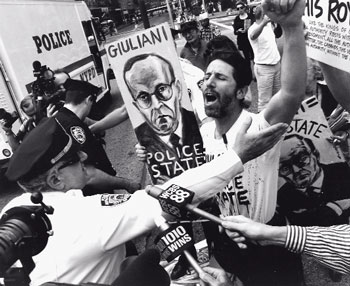By Elizabeth O’Brien
Art vendors cheered a federal court decision that upheld a lower court ruling against a permitting system for art sellers. But city officials said that the decision would have no bearing on the city’s ability to regulate selling in city streets or parks.
In 2001, a federal judge found that the city’s efforts to regulate art vendors with a permitting system violated a city code prohibiting mandatory licensing of so-called First Amendment vendors, or people who sell art or printed matter. On July 15, a judge for the United States Court of Appeals for the Second Circuit upheld the lower court’s decision on the basis of a 1996 ruling by the Second Circuit court that outlined special protections for peddlers of art and other written material.
“What this means is that the First Amendment prevails on every public sidewalk and park in New York City,” said Robert Lederman, a street artist who filed the case and has engaged in legal wrangling with the city for a decade.
“It’s a very important ruling,” said John Wetherhold, whose wife sells her original calligraphy in Battery Park.
City officials disagreed, saying the decision was technical and of limited importance.
“The court found only that the local law adopted by the City Council effectively prohibits the Parks Department from requiring permits for art vending,” said Robin Binder, one of the city attorneys who worked on the case, in a written statement. “Nothing in the decision prohibits the City Council from adopting a law that would explicitly give the Parks Department that authority, and such a proposal is currently under consideration.”
Within the next several months, the City Council is expected to evaluate Intro. 160, proposed legislation that would require vendors who sell art and printed matter in city parks to obtain a permit. While some vendors viewed last week’s court decision as the death of Intro. 160, officials said that they would proceed with the initiative.
In Lower Manhattan, the bill would have the biggest effect in Battery Park. Albany legislators have contemplated a vendor ban in the area near the World Trade Center site.
The city currently has the right to regulate the time, place and manner of vending throughout the five boroughs. The Parks Department oversees vending in city parks, while the Department of Consumer Affairs regulates vending on sidewalks.
Some art vendors said that they hoped last week’s decision would spur the city to more aggressive enforcement of illegal vending, such as the selling of counterfeit goods.
“We’re hoping the city will work with us to help identify original, actual artists,” said Lawrence White, a dance photographer who sells his art in Soho.
White said that the city could easily regulate vending without resorting to a permitting system, for example, by requiring all artists to sign their work and having enforcing officers match the signatures with those on artists’ picture identification.
The Department of Consumer Affairs has proposed a system whereby peddlers charged with operating illegally would be fingerprinted.
“It’s to intimidate people,” Wetherhold said of the fingerprinting idea. “I think a fine is enough.”
Elizabeth@DowntownExpress.com.
Sidewalk vendors activist Robert Lederman being arrested outside Cooper Union at former Mayor Giuliani’s commencement address in 1998.




































